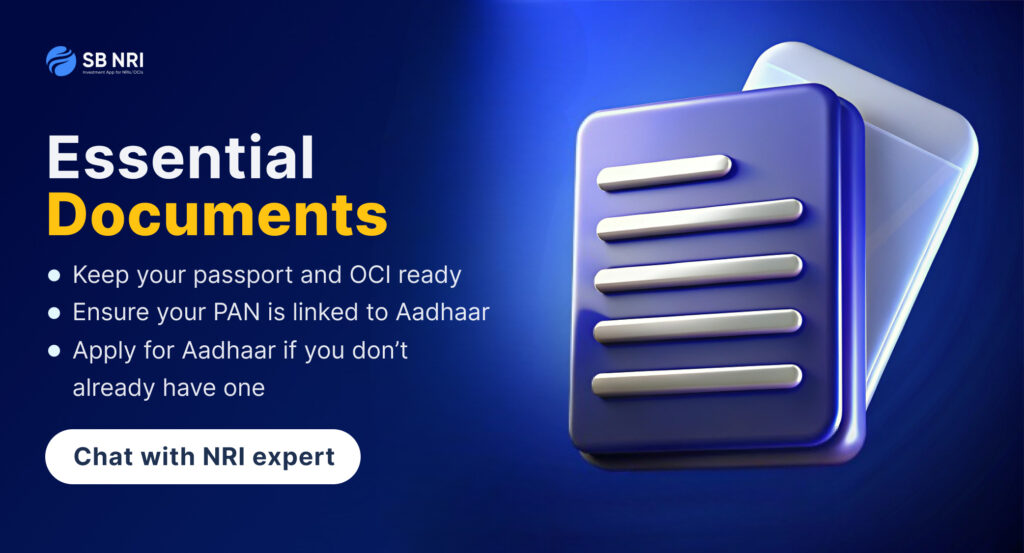
As global circumstances change, more Non-Resident Indians (NRIs) are choosing to return home. Shifts in visa regulations, growing economic opportunities, and the pull of family and cultural roots are motivating people worldwide. However, returning to India is not just about relocating; it is the beginning of a new financial journey.
So, to make this transition seamless, careful planning of your banking, investments, taxation, and insurance is essential. This guide is designed to help you take the right steps at the right time, so you can settle back comfortably and secure your financial future.
From converting overseas accounts to updating investments and insurance, we will guide you through every critical step. So, follow this roadmap to make your NRI return to India smooth, organized, and financially rewarding.
Download the SBNRI app now
Step 1: The Foundation – Essential Documents
Before planning flights or shipping belongings, secure your key documents. They form the foundation for all financial and legal processes in India. Some essential documents to arrange include:
- OCI Card & Passport: Ensure passports for you and your family are valid for at least a year. If you hold a foreign passport, your Overseas Citizen of India (OCI) card acts as a lifelong visa and proof of status. Keep both physical and digital copies safe.
- PAN Card: Your Permanent Account Number (PAN) is the cornerstone of your financial identity in India. Ensure it is active and linked to Aadhaar. If you do not have one, apply immediately after NRI returns to India. PAN is necessary for bank accounts, taxes, and investments.
- Aadhaar Card: Aadhaar is now required for most financial and government services. NRIs returning to India can apply using a valid Indian passport at an Aadhaar Seva Kendra. Prioritize this as soon as you arrive.\\

Apply or update your PAN card online with zero hassle and get it delivered worldwide. Download the app now.
Step 2: Banking: Convert and Update Accounts
As an NRI, you may hold accounts such as FCNR(B), NRE, and NRO. When returning to India permanently, it is important to convert these accounts to comply with Indian regulations and to ensure smooth financial management. Here’s what you need to know about each account type:
FCNR(B) Accounts
- Term deposits held in foreign currencies like USD, GBP, AUD, CAD, Euro, and Yen
- Interest is tax-free while you are an NRI
- After maturity or upon NRI return to India, convert to a Resident Foreign Currency (RFC) account or a resident rupee account
NRE Accounts
- Used for inward remittances and fully repatriable
- Must be converted to a resident savings account or RFC account if you wish to hold foreign currency
NRO Accounts
- For income earned in India such as rent, dividends, or pension
- Must be converted to a resident savings account after returning
Pro Tip: Many banks now allow you to open and manage accounts entirely online.
| Account Type | Purpose | Repatriation | Conversion on Return |
| FCNR(B) | Foreign currency term deposits | Yes | RFC account or Resident Rupee deposit |
| NRE | Indian rupee deposits from foreign earnings | Yes | Resident savings account or RFC account |
| NRO | Income earned in India such as rent, dividends, pension | Limited | Resident savings account |
Key Takeaway: Convert your accounts promptly to stay compliant and ensure smooth access to your funds during NRI return to India.
Step 3: Investment Planning
Returning NRIs should carefully rethink their investment portfolio. Foreign assets and income earned abroad are subject to taxation in India once you become a resident. Si, it is essential to review or liquidate foreign holdings based on your financial goals and repatriation plans.
Key Steps for Indian Investments:
- Update Residential Status: Inform mutual fund houses of your NRI return to India so your KYC details are accurate.
- Close NRI Stock Accounts: Portfolio Investment Scheme (PIS) accounts must be closed. Open standard Demat and brokerage accounts for seamless trading.
- Popular Investment Options for Residents:
- Mutual funds: Large-cap, diversified, or thematic funds
- Gold ETFs and Sovereign Gold Bonds (SGBs)
- Fixed deposits and bonds
- Mutual funds: Large-cap, diversified, or thematic funds
Pro Tip: Always link your investments to your resident bank account. This ensures smooth fund management and regulatory compliance.
Also read more: Best Mutual Funds to Invest in India 2025
Start building your wealth today with smart, easy investments. Explore 1,500+ mutual funds and start investing with just a few taps. Download the app now.
Step 4: Taxation – Understand Your Liability
Your tax liabilities change after your NRI return to India. Understanding your status is crucial to avoid penalties. Here’s a quick guide based on your status:
| Residential Status | Tax Implications | Notes |
| Resident and Ordinarily Resident (ROR) | Worldwide income is taxable in India | Must report all foreign assets in ITR |
| Resident but Not Ordinarily Resident (RNOR) | Foreign income is not taxed unless received in India | Some deposits, like FCNR, remain tax-exempt |
Key Note: Failing to report foreign assets can lead to heavy penalties under the Black Money (Undisclosed Foreign Income and Assets) Act.
Step 5: Currency & Foreign Exchange Management
Managing your foreign earnings wisely is critical when you return to India. Proper planning helps you protect value against currency fluctuations and ensures compliance with Indian regulations.
- RFC Account Benefits
A Resident Foreign Currency (RFC) account allows you to hold funds in foreign currencies such as USD, GBP, or Euro. This is especially useful if you plan to travel abroad frequently, have ongoing foreign expenses, or may move overseas again in the future. - Exchange Rate Planning
Decide whether to repatriate your funds immediately or continue holding them in foreign currency. Timing the conversion can help minimize losses from exchange rate volatility. - Tax Note
While you are a Resident but Not Ordinarily Resident (RNOR), interest earned in RFC accounts is tax-free. However, once you become a Resident and Ordinarily Resident (ROR), the interest is fully taxable in India.
Step 6: Insurance – Protect Yourself and Your Family
Insurance coverage obtained abroad usually does not apply in India. NRIs returning permanently should consider:
- Health Insurance: Comprehensive coverage for yourself and family is crucial.
- Life Insurance: Opt for term insurance plans with maximum coverage for financial security.
Step 7: Property & Assets – Secure Your Home
Managing property is an important consideration.
- Buying Property: As a resident, you can buy any number of residential or commercial properties. Restrictions for NRIs no longer apply.
- Selling Property: Proceeds from property sold while NRI can be repatriated up to USD 1 million per financial year, subject to documentation and taxes.
Action: Always engage a reputable lawyer for due diligence. Maintain a clear paper trail for all funds used during your NRI return to India.
Step 8: Pre-Return Checklist – Before You Leave
- Apply for Aadhaar if you don’t have one.
- Ensure bank accounts can be managed digitally.
- Update KYC for banks and investments to reflect your resident status
- Open a Public Provident Fund (PPF) account if you were previously ineligible as an NRI.
- Appoint a Power of Attorney (POA) for legal or property matters in India.
- Arrange house/property management through services.
- Invest in Sovereign Gold Bonds (SGBs) before status changes.
Step 9: Post-Return Checklist – After You Arrive
After returning to India, focus on compliance and smooth financial integration:
| Action Item | Purpose / Benefit |
| Update KYC and FATCA | Ensure residential status is updated on the income tax portal |
| Convert Bank Accounts | NRE/NRO accounts must be converted to resident accounts to avoid penalties |
| Open NRE/NRO Accounts | For inward remittances and tax-free interest on foreign funds |
| PIS/PINS Account | Necessary for holding and trading Indian securities from NRE accounts |
| Link Investments | Seamless management and regulatory compliance |
| Apply for NRI Credit Card | Maintain access to credit after residential status changes |
| Healthcare Insurance | Essential for permanent return to India |
| Check Passport Validity | Renew if expiring at Indian embassy or passport center |
Final Thoughts
Returning to India as an NRI is more than just moving back home. It marks the start of a new financial journey. Every step matters, from converting your bank accounts and updating investments to understanding taxation, insurance, and property regulations. Careful planning ensures that your NRI return to India is smooth and financially rewarding.
The sooner you organize your documents, banking, and compliance, the easier it will be to settle in and focus on your family, career, or retirement. With the right strategy, your return can open opportunities to grow and protect your wealth in India.
Download the app to chat with our NRI expert and plan your smooth return to India.
Frequently Asked Questions (FAQs)
Q1. Can an NRI return to India?
Yes. NRIs can return at any time. Updating residential status for banking, investments, and taxation is essential after an nri return to India.
Q2. Is NRI income taxable after moving back to India?
Yes. Once you become a Resident and Ordinarily Resident (ROR), worldwide income is taxable in India. If you are Resident but Not Ordinarily Resident (RNOR), only income earned in India is taxable.
Q3. Why are NRIs returning to India permanently?
NRIs are returning to India permanently due to changes in visa rules, career or business opportunities, family commitments, or the desire to settle long-term in India.
Q4. Do NRIs have to file income tax returns in India?
Yes. NRIs must file income tax returns for income earned in India. After returning, residents are required to report both Indian and foreign income and assets according to their residential status.
Q5. What should NRIs do about bank accounts after returning?
NRE, NRO, and FCNR accounts should be converted to resident or RFC accounts. Updating KYC and ensuring online access is essential for smooth account management after an nri return to India.
Q6. Can NRIs continue holding foreign investments after returning?
Yes. NRIs can retain foreign bank accounts and assets, but these must be declared in Indian tax filings once classified as ROR.
Q7. Are insurance policies from abroad valid in India?
Generally, no. NRIs returning to India permanently should obtain health and life insurance plans locally.
Q8. Can NRIs buy property after returning?
Yes. Once a resident, NRIs can buy any number of residential or commercial properties. Restrictions no longer apply after an nri return to India.



